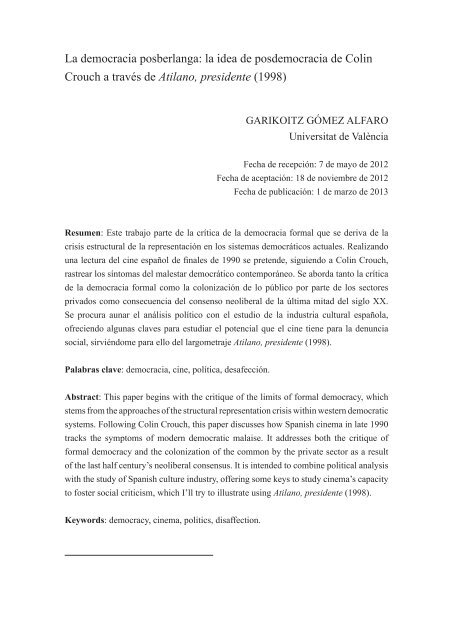Segundo%20nu%CC%81mero%20de%20la%20Revista%20Historia%20Auto%CC%81noma
Segundo%20nu%CC%81mero%20de%20la%20Revista%20Historia%20Auto%CC%81noma
Segundo%20nu%CC%81mero%20de%20la%20Revista%20Historia%20Auto%CC%81noma
You also want an ePaper? Increase the reach of your titles
YUMPU automatically turns print PDFs into web optimized ePapers that Google loves.
La democracia posberlanga: la idea de posdemocracia de Colin<br />
Crouch a través de Atilano, presidente (1998)<br />
GARIKOITZ GÓMEZ ALFARO<br />
Universitat de València<br />
Fecha de recepción: 7 de mayo de 2012<br />
Fecha de aceptación: 18 de noviembre de 2012<br />
Fecha de publicación: 1 de marzo de 2013<br />
Resumen: Este trabajo parte de la crítica de la democracia formal que se deriva de la<br />
crisis estructural de la representación en los sistemas democráticos actuales. Realizando<br />
una lectura del cine español de finales de 1990 se pretende, siguiendo a Colin Crouch,<br />
rastrear los síntomas del malestar democrático contemporáneo. Se aborda tanto la crítica<br />
de la democracia formal como la colonización de lo público por parte de los sectores<br />
privados como consecuencia del consenso neoliberal de la última mitad del siglo XX.<br />
Se procura aunar el análisis político con el estudio de la industria cultural española,<br />
ofreciendo algunas claves para estudiar el potencial que el cine tiene para la denuncia<br />
social, sirviéndome para ello del largometraje Atilano, presidente (1998).<br />
Palabras clave: democracia, cine, política, desafección.<br />
Abstract: This paper begins with the critique of the limits of formal democracy, which<br />
stems from the approaches of the structural representation crisis within western democratic<br />
systems. Following Colin Crouch, this paper discusses how Spanish cinema in late 1990<br />
tracks the symptoms of modern democratic malaise. It addresses both the critique of<br />
formal democracy and the colonization of the common by the private sector as a result<br />
of the last half century’s neoliberal consensus. It is intended to combine political analysis<br />
with the study of Spanish culture industry, offering some keys to study cinema’s capacity<br />
to foster social criticism, which I’ll try to illustrate using Atilano, presidente (1998).<br />
Keywords: democracy, cinema, politics, disaffection.


